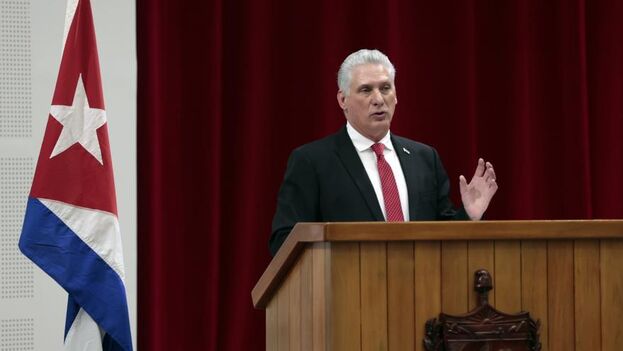
![]() EFE/14ymedio, Havana, 27 October 2022 — Cuban president Miguel Díaz-Canel said on Wednesday that his government is open to dialogue with the United States but only on a basis of equality and with respect for the island’s “sovereignty” and “integrity.”
EFE/14ymedio, Havana, 27 October 2022 — Cuban president Miguel Díaz-Canel said on Wednesday that his government is open to dialogue with the United States but only on a basis of equality and with respect for the island’s “sovereignty” and “integrity.”
Díaz-Canel made his remarks during a gathering with more than twenty U.S. business leaders at the Palace of the Revolution in Havana. The event was part of the bilateral business forum, the first since 2016, when both countries where trying to normalize relations.
“We are open to strengthening dialogue and relations with any country in the world, especially the United States,” stressed the Cuban president, adding that such contacts were contingent upon respect for the island’s “sovereignty and integrity,” and rejection of “unilateral and coercive positions.”
He added, “Under these conditions, there can be dialogue and closer relations, regardless of the ideological differences we have.”
Díaz-Canel condemned the 243 sanctions applied against his country by the Trump administration, in particular placing Cuba on a list of countries that engage in state-sponsored terrorism.
He described the action as “totally dishonest and irrational” while also criticizing the Biden administration for maintaining many of the same sanctions.
The Cuban president also said the U.S. embargo was having crippling effects on the country’s banking system by preventing hard currency deposits in foreign financial institutions, restricting access to credit and limiting operations between Cuban and foreign banks.
He also said it was “cruel” for the U.S. to double-down on this policy during the Covid-19 pandemic, when Cuba was in the midst of a healthcare emergency.
In this regard, he told those at the gathering that Washington “used all means to ensure that Cuba could not gain access to vaccines and medicines” that it needed at the time, adding that the U.S. even “denied and blocked the possible purchase of pulmonary ventilators.”
But he stressed that, in spite of all this, Cuba “was not deterred” and managed to develop its own vaccines, which have allowed it to immunize its population, control the coronavirus and reduce Covid-related deaths to “zero.”
From the outset, Cuba rejected buying vaccines from abroad, claiming that domestic production could be just as effective and certainly cheaper. Subsequently, officials reaffirmed their position, asserting that countries which participated in the Covax initiative were slow to receive vaccines while Cuba was able to immunize a huge percentage of its population much faster than others.
The island was also able to manufacture its own ventilators and maintained a firm policy of support for domestically produced medicine and pharmaceuticals. It was also able to acquire ventilators as well as tons of material aid and medications from other countries, including the United States.
The Cuba-U.S. business forum, which will continue through Friday, is the latest sign of the improving state of bilateral relations in recent months, though they are not yet at the point of what could be called a “thaw.”
The last such meeting took place in 2016 during a visit to Cuba by the then U.S. president, Barack Obama, during a period of improved relations initiated by him and the former Cuban president, Raul Castro. This process was put on hold, however, with the election of Donald Trump.
____________
COLLABORATE WITH OUR WORK: The 14ymedio team is committed to practicing serious journalism that reflects Cuba’s reality in all its depth. Thank you for joining us on this long journey. We invite you to continue supporting us by becoming a member of 14ymedio now. Together we can continue transforming journalism in Cuba.
